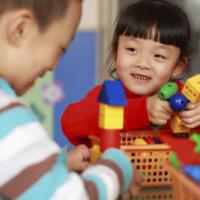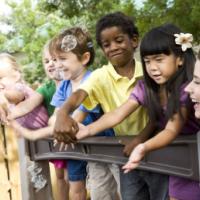Ever wish you could take a break from the routine? Well, for very young children routines build a sense of security and self-confidence. They may also help children do better in school and be more successful adults.
Resources
Family Routines and Social-Emotional School Readiness Among Preschool-Age Children (Journal of Developmental and Behavioral Pediatrics)
Love, Learning, and Routines (Zero to Three)
Do you want to know how your child care provider stacks up against others? The Maryland State Department of Education's Maryland EXCELS program can tell you just that. When a child care provider or public pre-K classroom enrolls in the EXCELS program, quality assurance specialists from MSDE verify that all the standards have been met. That means, in general, the more standards that are met, the better the care and education for our children.
Resources
Reliable child care is just a phone call away. Take the time to make the right choice—the first five years last forever. Early childhood development occurs rapidly, so choosing a reliable care provider is critically important. LOCATE: Child Care, a FREE phone referral service, can help you make the right choice. Call one of our specialists who will take the time you need to: • discuss care preferences—program type, location, costs, more • search our database of child care programs in Maryland • provide options available in your neighborhood or near your workplace Call us right now at 877.261.0061 or explore LOCATE: Child Care for more information.
Resources
Choosing Child Care for Children with Special Needs (Maryland Family Network—LOCATE: Child Care)
Got a picky eater at home? Relax. It's not uncommon for young children to turn down a new food up to 15 times before they even try it. Zero to Three has some ideas that may help around your dinner table.
Resources
10 Tips for Picky Eaters (Mayo Clinic)
Feeding the Picky Eater: 17 Tips (Ask Dr. Sears)
Young children are naturally active. So if we give them plenty of room and opportunity to move, they'll literally jump at the chance. Children who exercise are healthier physically and emotionally. Here are some ways to get kids moving.
Resources
Recommendations for Physical Activity in Children (American Heart Association)
Seven Games to Get Kids Moving (Grandparents.com)
Young children have needs that we often take for granted when the sky is blue. But are you prepared for how to help them when disaster strikes? We have information about how your family can be prepared for whatever Mother Nature sends our way. A little planning now can save lives when disaster strikes.
Resources
When you find a child care provider who's just right, you know your little one is in a safe nurturing environment. But there is more to it than dropping off in the morning and picking up after work. For the wellbeing of the child, both parents and caregivers owe it to each other to communicate.
Resources
Importance of Caregiver-Parent Communication (GlobalPost)
Effective Communication With Parents (Zero to Three)
Math helps children develop critical thinking and problem-solving skills. The developing brain is not only ready to learn and use language, it is also capable of learning and using math and scientific thinking. It is important to practice and develop these skills early.
Resources
Math Talk With Infants and Toddlers (NAEYC)
What Explains Toddlers' Linguistic Leap? Math. (Scientific American)
From the day they're born, children communicate in many ways. The national nonprofit Zero to Three has some tips to help parents encourage language development in babies.
Resources
Learning doesn't stop in the summertime. Whether you go down to the ocean or stay at home, chances to learn are everywhere.
Resources
Summer Learning Day Resources for Parents (National Summer Learning Association)
Field Trips for Summer Fun (Child Care Aware)
Summer Reading Tips for Parents of Babies, Toddlers and Young Children (PBS Kids)
Summer Ideas for Pre-K (Pinterist)
Stay Safe Around the Water (American Red Cross)












